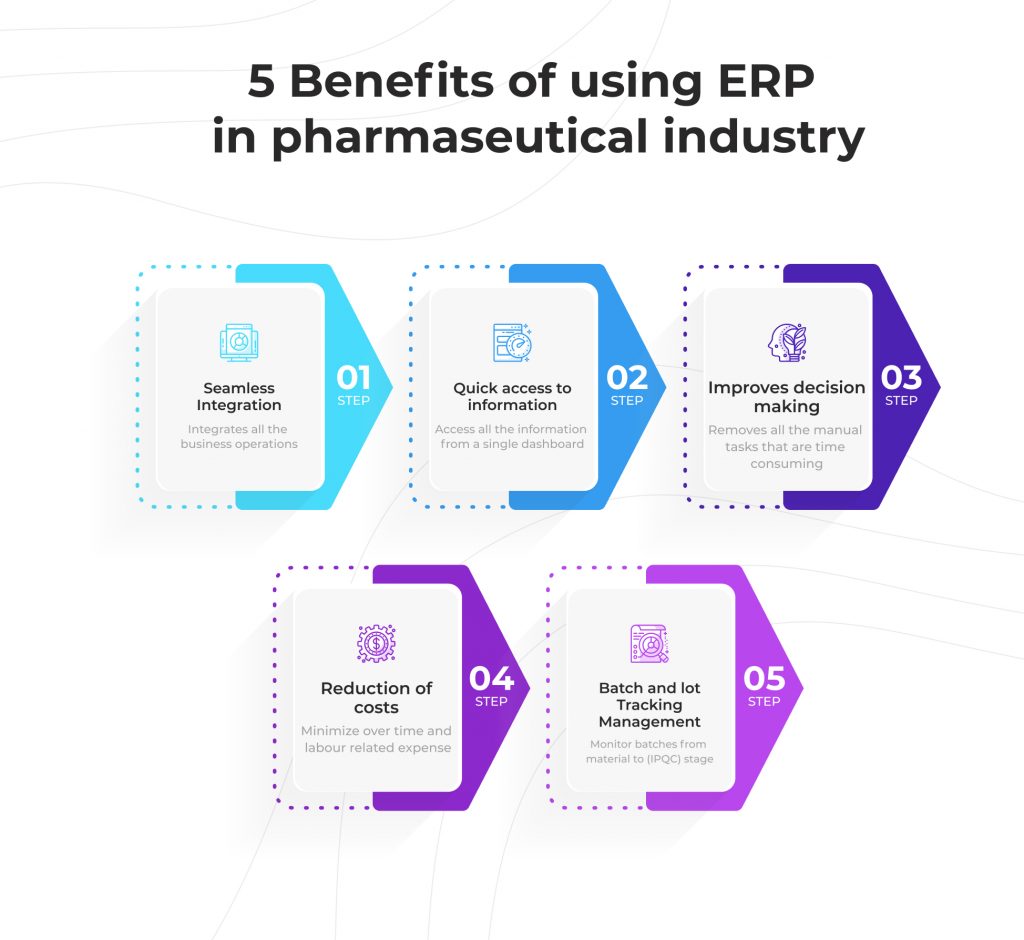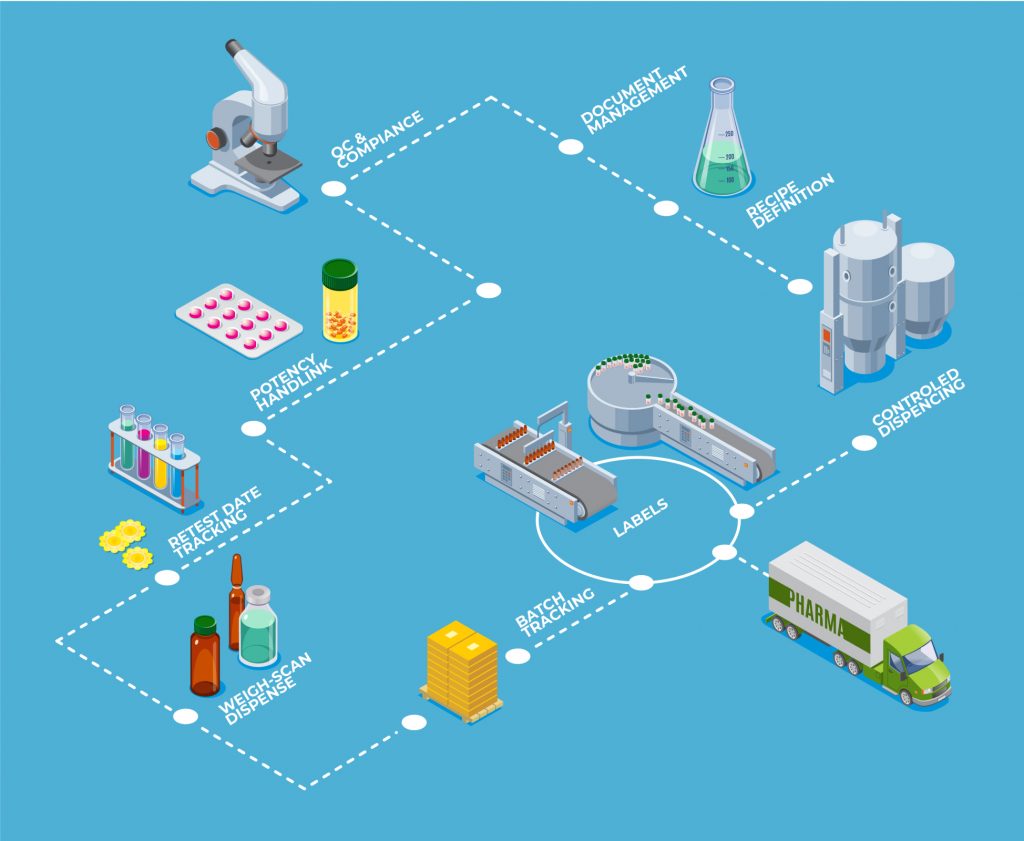The pharmaceutical industry is one of the most regulated in the world. This creates challenges other businesses might not encounter in their everyday operations. At the same time, pharmaceutical companies should pay extra attention to following every compliance, advanced inventory management of quickly perishable goods, and in-progress quality control.
At this point, ERP software can bring a lot to pharmaceutical manufacturers and help them manage most essential processes more efficient and simpler than ever. However, as the pharma industry has a lot of specifics, pharma companies need to acquire pharma ERP software instead of some general ERP solution.
Choosing to develop a custom ERP system for your pharmaceutical business might be the best decision, as you can fully tailor the functionality for your operations and processes. This will make the process of adoption easier, as well as open more opportunities to grow your business.
So, what features should pharmaceutical manufacturing software have and how can it really contribute to your business? Let’s contemplate together in this article.
Why do You Need Pharmaceutical Manufacturing Software?
So, what is the real value of ERP solutions for pharma businesses? We collected the main benefits an ERP system can bring for companies in this industry.

Process Optimization
Pharmaceutical manufacturing consists of dozens of operations, from batch tracking and quality assurance to supply chain management and inventory control. Every step should be tracked carefully, as any pharmaceutical company can’t allow itself to use expired raw materials, release compromised batches, or neglect proper document flow.
ERP systems gather all this data in one platform, giving it structure and necessary functionality to easily track every step, and streamline the processes. As a result, you will be able to implement automation, and enable profound transparency and traceability of inventory, batches, supplies, etc. Overall, it will lead to increased efficiency, and lesser delays, and mistakes.
Cost Optimization
Any ERP solution helps companies not only to optimize processes but expenses as well. Increased transparency and automation reduce the number of human errors, and in turn, it can decrease the cost you will spend on maintenance and support.
Moreover, the majority of ERP solutions also have tracking and analysis capacities which give you an opportunity to evaluate your processes and find places for improvement.
360-degree Data Overview
An ERP system gathers and organizes data on everything, including manufacturing operations and sales funnels. You get a full overview and full history of your interactions with suppliers, distributors, and customers.
This helps you in several ways: firstly, you can leverage this data to improve your approaches and strategies; secondly, it will protect you from data being lost or compromised.
Enhanced Compliance Management
Anyone who is related to the pharmaceutical industries understands the importance of compliance. FDA compliance in US and EMA compliance in Europe dictate a lot of rules and restrictions for pharmaceutical manufacturers.
- https://www.fda.gov/drugs/guidance-compliance-regulatory-information
- https://www.ema.europa.eu/en/human-regulatory/overview/compliance-overview
Ensuring that everything is compliant in your manufacturing process is a hard task. Human neglect or simple error might lead to serious problems later, so adding a robust tool is a way to eliminate such possibilities. Process manufacturing software solutions like the aforementioned ERP systems will be able to power up appropriate workflow, run audits and regular checks, and ensure thorough quality management.
Such capacities will simplify the challenge of compliance for pharmaceuticals companies and relief them from a big amount of head pains.
Challenges of Pharmaceutical Manufacturing Software

As you can see, adopting enterprise resource planning software for pharma companies is definitely a step in the right direction for future growth and expansion. However, any ERP implementation project demands a lot of resources, including finances, a sufficient level of involvement from the company’s team, experienced developers, and so on.
With such a big project, there are a lot of things that can go wrong. However, there are some common challenges that generate the majority of issues and disruptions. Let’s contemplate them together.
Lack of Digital Expertise
To develop a suitable solution and tailor it to your manufacturing and business processes, you need to have experienced people who will take over software development, including formulating requirements, data migration, and system implementation.
Usually, IT departments are lacking such experts and are unable to conduct such projects efficiently, even if there is a possibility to expand the team and hire new experts.
💊 Solution
In such a case, you can outsource the development and find software vendors who will be able to deliver a quality product. It might be the best decision, as you can choose an outsourcing company with relevant experience in the industry.
Such a partner will be able to guide you through the whole process of adoption, not only the development. You will be able to count on acquiring quality software while saving money and time on development (hiring and building an in-house development team just for one project would be too expensive, challenging, and clearly, unwise).
Legacy Infrastructure
If you haven’t modernized some of your approaches in a long time, or you have adjusted them sometime in the past to a legacy application, they might not be as efficient as they were and won’t fit the capacities of the new ERP system.
💊 Solution
To adopt pharmaceutical manufacturing software, you might need to reevaluate your processes and redesign them. This process might also demand employee retraining, so it is better to understand and plan these changes beforehand.
Implementation
You might invest a lot into the development of a custom pharmaceutical ERP system only to find later that it doesn’t work as you planned. And the issues will lay here in a human factor and employee pushback.
ERP implementation is a serious change, which will ask your employees to change as well. Old-timers who have been with your company for years and have used to do things a certain way, most likely won’t meet it with excitement. Consciously or unconsciously, they can sabotage the implementation, and your new ERP solution won’t show its full potential and value.
💊 Solution
To avoid pushback, you need to prepare and educate your team beforehand. Explain why the company made a decision to implement a new solution, how the process will go, what level of involvement is needed from employees and how eventually the ERP implementation will help employees do their work easier and more efficiently.
Pharmaceutical ERP Requirements
Pharma ERP should have some specifics that general ERP solutions might not have. Here is a list of the main requirements of ERP solutions tailored for the pharmaceutical industry.
Key Modules of Pharmaceutical ERP Software
So, what are the key functions of ERP pharmaceutical software? We would divide the functionality of an ideal pharma ERP into two parts: pharmaceutical manufacturing functionality and administrative features you can encounter in every other ERP system. Let’s look at them in detail.
Batch Production
This module is responsible for everything related to batch production and its management. Here, you can adjust batch formulas and packaging bills of material, manage equipment and its maintenance, assign equipment and labor to batch jobs, and many other features you might need for batch manufacturing.
Planning and Scheduling
Advanced scheduling and planning allow you to find a perfect balance between demand, supply, and your manufacturing capacities. It takes care of the next data: production demand, master schedules, bills of materials, change orders, inventories, and planned resources.
When done right, you can get a significant boost in productivity, minimize inventory, reduce changeover time and improve on-time delivery.
Inventory
Inventory management is essential for pharma, as for any other manufacturing business. However, a pharma ERP system should consider specifics of pharma inventory and include features that a general ERP solution might not have.
Pharma inventory features should cover active ingredients, the stock managed by potency, average potency percentage, expiry, use-by-date coefficients, lot control, serialization, and other regulatory compliance requirements
Formulation Management
Formulation management is an important part of batch manufacturing. It doesn’t work like in regular ERP manufacturing solutions that track products that can be assembled or disassembled discretely.
Pharma products depend on complex formulas, and pharmaceutical ERP solutions help to optimize them.
Warehousing
There are a lot of challenges in logistics and warehouse management for pharma companies. Strict regulations dictate the condition and time for product storage, inefficient processes inflate the cost of all logistics operations, and the variety of manufacturing locations might complicate your supply chain and distribution.
The warehousing feature should help you track and control every step in this chain, and hence, reduce the chance of disruptions and bottlenecks.
Quality Control and Quality Assurance
Quality assurance and quality control are deeply integrated into pharma manufacturing. As it is an integral part of the process, the corresponding feature should be a must-have for any pharma ERP solution.
The data about product quality should be gathered and visible at every step of the product lifecycle. The wide functionality of QA/QC will help you to avoid disposals or quarantining the batches.
Costing & Analytics
This feature helps you to get an insight into the cost of your product, which of course, consists of dozens of factors and steps in your manufacturing processes.
You might use this data to find ways how to decrease the cost and eventually increase your profits.
Administrative
While the previous modules were related to the process of pharma manufacturing, you can see the modules in regular ERP software. They cover the processes that are typical for every business and include:
- marketing and sales;
- accounting and financial management;
- customer relationship management;
- HR;
- supply chain.

Pharma ERP Software Development with Altamira
Altamira is a software vendor experienced in solution development for the pharmaceutical industry. We have delivered a number of systems for pharma businesses and have a team of experts who have studied the specifics and regulations that pharma solutions will need.
Cooperating with us on your pharma software development, you will benefit from:
In Conclusion
Pharmaceutical manufacturing software is a powerful tool that can help your business grow and expand. However, the pharmaceutical industry is very specific, hence, your software solution should reflect that.
Choose a custom pharmaceutical ERP solution to get the most from software implementation. And to ensure that your custom ERP will help you to reach your full potential, take your time to find a reliable software partner who will deliver a quality product of full value.
FAQ






